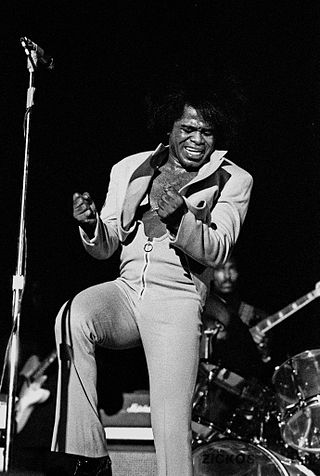
James Joseph Brown was an American singer, dancer, and musician. The central progenitor of funk music and a major figure of 20th-century music, he is referred to by various nicknames, among them "Mr. Dynamite", "the Hardest-Working Man in Show Business", "Minister of New Super Heavy Funk", "Godfather of Soul", "King of Soul", and "Soul Brother No. 1". In a career that lasted more than 50 years, he influenced the development of several music genres. Brown was one of the first ten inductees into the Rock and Roll Hall of Fame on January 23, 1986. His music has been heavily sampled by hip-hop musicians and other artists.
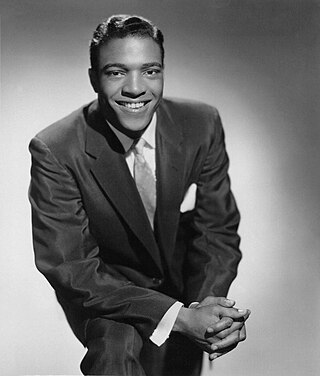
Clyde Lensley McPhatter was an American rhythm and blues, soul, and rock and roll singer. He was one of the most widely imitated R&B singers of the 1950s and early 1960s and was a key figure in the shaping of doo-wop and R&B.

Hank Ballard was an American singer and songwriter, the lead vocalist of the Midnighters and one of the first rock and roll artists to emerge in the early 1950s. He played an integral part in the development of the genre, releasing the hit singles "Work with Me, Annie" and answer songs "Annie Had a Baby" and "Annie's Aunt Fannie" with his Midnighters. He later wrote and originally recorded "The Twist" which was notably covered a year later by Chubby Checker, this second version spreading the popularity of the dance. He was inducted into the Rock and Roll Hall of Fame in 1990.
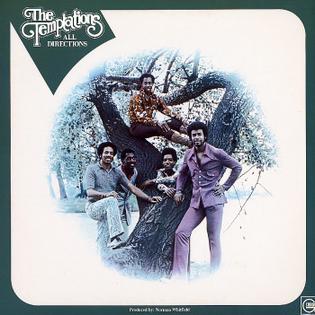
All Directions is a 1972 album by The Temptations for the Gordy (Motown) label, produced by Norman Whitfield. It reached number two on the Billboard 200, making it the band's most successful non-collaborative album on the chart, and became their twelfth album to reach number one on the Top R&B Albums chart.

"Please, Please, Please" is a rhythm and blues song performed by James Brown and the Famous Flames. Written by Brown and Johnny Terry and released as a single on Federal Records in 1956, it reached No. 6 on the R&B charts. The group's debut recording and first chart hit, it has come to be recognized as their signature song.

"Papa's Got a Brand New Bag" is a song written and recorded by James Brown. Released as a two-part single in 1965, it was Brown's first song to reach the Billboard Hot 100 Top Ten, peaking at number eight, and was a number-one R&B hit, topping the charts for eight weeks. It won Brown his first Grammy Award, for Best Rhythm & Blues Recording.
"The Three Bells", also known as "The Jimmy Brown Song", "Little Jimmy Brown", or simply "Jimmy Brown", is a song made popular by the Browns in 1959. The song is an English adaptation of the French language song "Les Trois Cloches" written by Jean Villard, with English lyrics by Bert Reisfeld. The single reached number one in the U.S. on Billboard's Hot C&W Sides chart and the Billboard Hot 100 chart in 1959.

"Baby, Please Don't Go" is a traditional blues song that was popularized by Delta blues musician Big Joe Williams in 1935. Many cover versions followed, leading to its description as "one of the most played, arranged, and rearranged pieces in blues history" by French music historian Gérard Herzhaft.

Billy Ward and his Dominoes were an American R&B vocal group. One of the most successful R&B groups of the early 1950s, the Dominoes helped launch the singing careers of two notable members, Clyde McPhatter and Jackie Wilson.
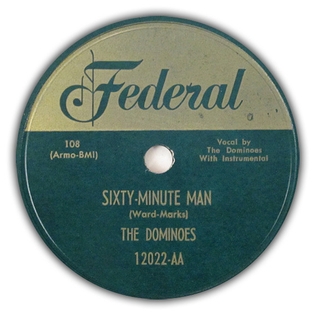
"Sixty Minute Man" is an R&B record released on Federal Records in 1951 by the Dominoes. It was written by Billy Ward and Rose Marks and was one of the first R&B hit records to cross over to become a hit on the pop chart. It is regarded as one of the most important of the recordings that helped generate and shape rock and roll.

The Famous Flames were an American rhythm and blues, soul vocal group founded in Toccoa, Georgia, in 1953 by Bobby Byrd. James Brown first began his career as a member of the Famous Flames, emerging as the lead singer by the time of their first appearance in a professional recording, "Please, Please, Please", in 1956.
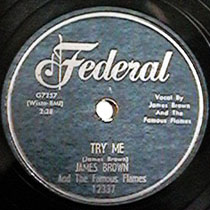
"Try Me", titled "Try Me (I Need You)" in its original release, is a song recorded by James Brown and the Famous Flames in 1958. It was a #1 R&B hit and charted #48 Pop—the group's first appearance on the Billboard Hot 100. It was Brown and the Flames' second charting single, ending a two-year dry spell after the success of "Please, Please, Please".
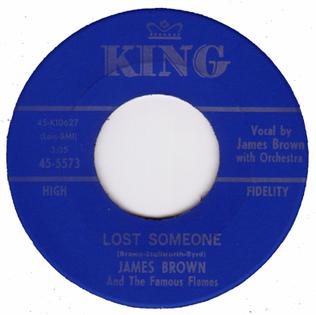
"Lost Someone" is a song recorded by James Brown in 1961. It was written by Brown and Famous Flames members Bobby Byrd and Baby Lloyd Stallworth. Like "Please, Please, Please" before it, the song's lyrics combine a lament for lost love with a plea for forgiveness. The single was a #2 R&B hit and reached #48 on the pop chart. According to Brown, "Lost Someone" is based on the chord changes of the Conway Twitty song "It's Only Make Believe". Although Brown's vocal group, The Famous Flames did not actually sing on this tune, two of them, Byrd and Stallworth, co-wrote it with Brown, and Byrd played organ on the record, making it, in effect, a James Brown/Famous Flames recording.

"I'll Be Around" is a song recorded by the American R&B vocal group The Spinners. It was co-written by Thom Bell and Phil Hurtt and produced by Bell.

"Out of Sight" is a funk song recorded by James Brown in 1964 featured on the album of the same name. A twelve-bar blues written by Brown under the pseudonym "Ted Wright", the stuttering, staccato dance rhythms and blasting horn section riffs of its instrumental arrangement were an important evolutionary step in the development of funk music.
"Shout and Shimmy" is an R&B song written by James Brown, and recorded by him and The Famous Flames. It rose to #16 on the R&B chart and #61 on the Billboard Hot 100.

"Please Come Home for Christmas" is a Christmas song, written in 1960 and released the same year by American blues singer and pianist Charles Brown. Hitting the Billboard Hot 100 chart in December 1961, the tune, which Brown co-wrote with Gene Redd, peaked at position number 76. It appeared on the Christmas Singles chart for nine seasons, hitting number 1 in 1972. It includes a number of characteristics of Christmas music, such as multiple references in the lyrics to the Christmas season and Christmas traditions, and the use of a church bell type sound, created using tubular bells, at the start of the song. The song has been covered by many artists, including by Eagles, Etta James, U2 and Cher.
"Oh Baby Don't You Weep" is a song recorded in 1964 by James Brown and The Famous Flames. Based upon the spiritual "Mary Don't You Weep", it was recorded as an extended-length track and released as the first two-part single of Brown's recording career. It peaked at #23 on the Billboard Hot 100 and at #4 on the Cash Box R&B Chart.. It was the last original song featuring the Famous Flames to chart, not counting the 1964 re-release of "Please, Please, Please" and the 1966 B-side release of the Live at the Apollo performance of "I'll Go Crazy".

Pure Dynamite! Live At The Royal is a 1964 live album by James Brown and The Famous Flames. Originally issued on King Records, it was the live follow-up to Brown's 1963 Live at the Apollo LP, and like that album, reached the Top 10 of the Billboard Pop album charts, peaking at #10. It was recorded live at the Royal Theatre in Baltimore, Maryland, a popular venue for R&B artists of the day. The album takes its title from Brown's most famous nickname at the time, "Mr. Dynamite".
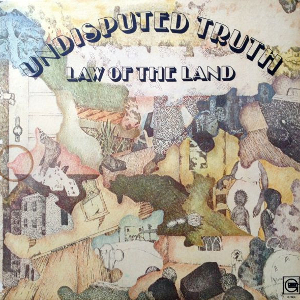
Law of the Land is the third album by the Norman Whitfield's Motown group The Undisputed Truth.
















